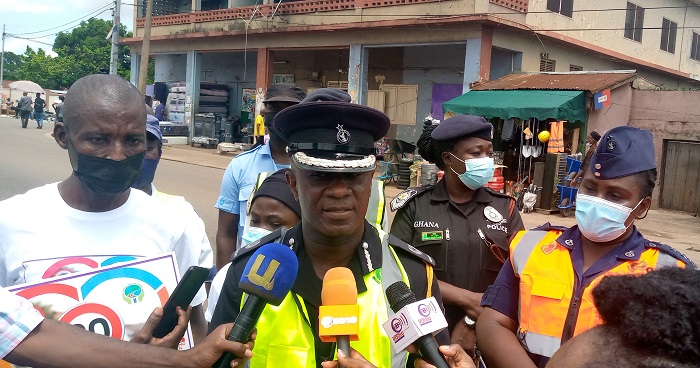ACP Kwaku Buah, flanked by Mr. Richard Karikari (L) and DSP Mary Nana Adwoa Affanyi (R)
THE MANHYIA Divisional Police Commander, Assistant Commissioner of Police (ACP) KwakuBuah, has admonished motorists in the Ashanti Region to drive carefully and slowly in build-up areas to avoid accidents.
The police chief urged drivers not to drive beyond 30km/h in areas close to markets, churches, mosques, schools so as to protect lives and property.
ACP KwakuBuah was speaking at the 6th UN Safety Week celebration launched by the Oli Best Road Safety Organisation (OBRSO) in Kumasi on Monday, May 17, 2021.
He said the police would arrest and prosecute deviant drivers who flout the simple instruction of driving 30km/h in the built-up areas.
The Manhyia Divisional Police Commander, who doubles as the Board Chairman of Oli Best Road Safety Organisation, also advised riders of motorbikes to wear their helmets when riding to protect their lives.
Richard Karikari, the Chief Executive Officer (CEO) of OBRSO, called on policy-makers to limit speeds to 30 km/h (20 mph) on streets where pedestrians, cyclists and others mix.
“Above 30 km/h impact speeds, pedestrians are at a considerably greater risk of death. This is even greater for the young and elderly,” he said.
He called on the Ministry of Transport (MoT), the National Road Safety Authority (NRSA) and the Ghana Police Service (GPS) to ensure discipline on the road networks.
Richard Karikari, however, lamented that successive governments have failed to recognise and support his organisation’s road safety campaign efforts since its inception five years ago.
On her part, DSP Mary Nana AdwoaAffanyi, Manhyia Divisional Commander of the Motor Traffic and Transport Division (MTTD), appealed to stakeholders to join the fight against road crashes in the region.
This years’ safety week campaign dubbed, “The Streets for Life and Love 30 Campaign” was used to implore drivers to shift towards a new 30 km/h approach as the new normal to livable streets.
A 30 km/h or 20 mph speed helps make streets that are healthy, green, and livable.
According to United Nations report on road safely, 30 km/h streets save lives and protect all those who use them, especially vulnerable road users like pedestrians, cyclists, children, senior citizens, and people with disabilities.
FROM David Afum, Kumasi


